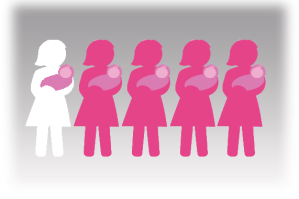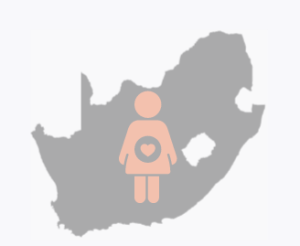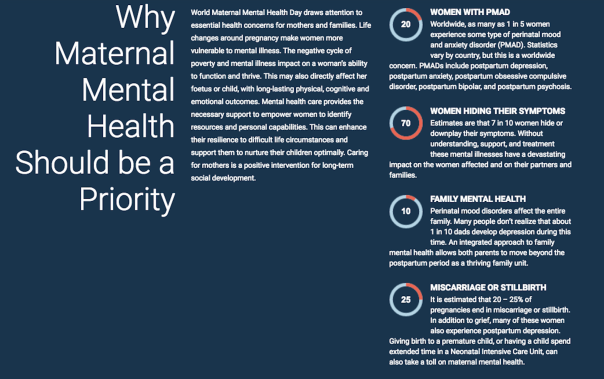MMH at a glance
Why should we care about Maternal Mental Health?
Perinatal depression and anxiety are significant mental and public health problems with well-documented consequences for mothers, children, and families.
Life changes around pregnancy can make women more vulnerable to mental illness. The negative cycle of poverty and mental illness impact on a women’s ability to function and thrive. This may also directly affect her foetus or child, with long-lasting physical, cognitive and emotional outcomes. Mental health care provides the necessary support to empower women to identify resources and personal capabilities. This can enhance her resilience to difficult life circumstances and support her to nurture their children optimally. Caring for mothers is a positive intervention for long-term social development.
What is perinatal mental health disorder?
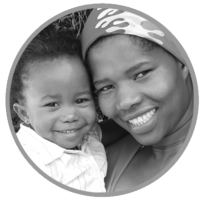 It is important not to confuse the ‘baby blues’ with postnatal depression. ‘Baby blues’ may not always require treatment, but more serious conditions like depression or anxiety do. The common mental disorders may be diagnosed when several symptoms are present for more than two weeks and the symptoms negatively impact on functioning at work/school, socially or in the home.
It is important not to confuse the ‘baby blues’ with postnatal depression. ‘Baby blues’ may not always require treatment, but more serious conditions like depression or anxiety do. The common mental disorders may be diagnosed when several symptoms are present for more than two weeks and the symptoms negatively impact on functioning at work/school, socially or in the home.
The perinatal period refers to the period of time between the early stages of pregnancy, including childbirth, and ends with the first year of being a parent.
Find more definitions on perinatal mood disorder here
Who is at risk of perinatal mental health disorder?
Worldwide about 10% of pregnant women and 13% of women who have just given birth experience a mental disorder, primarily depression. In developing countries this is even higher, i.e. 16% during pregnancy and 20% after child birth.
Source World Health Organization WHO
In South Africa, about one in every five women suffering during or after pregnancy.
Several studies on prevalence and determinants of common perinatal mental disorders in women in low and lower middle income countries are collated on our website.
Who is at risk of perinatal mental health disorder?
Common mental disorders during pregnancy and in the first year after birth are associated with certain risk factors. These include poverty, migration, extreme stress, exposure to violence (domestic, sexual and gender-based), previous history of mental disorders, alcohol and other drug use as well as low social support.
In South Africa, there is a very high prevalence of adolescent pregnancies with 39% of 15- to 19-year old girls being pregnant at least once. When adolescent mothers suffer from depression, the likelihood of a subsequent teenage pregnancy nearly doubles.
Detection
Pregnant women and mothers in the postpartum period are not routinely screened for maternal mental health disorders in South Africa, though there are recommended and proven screening tools. This is largely due to a shortage of, qualified care providers who can provide the necessary treatment.
The PMHP model aims to identify those women at risk or currently experiencing symptoms of depression and anxiety at our service sites.
Integration
Mothers in many settings are using maternal and child health services as well as social services. Thus, detection and access will increase if maternal health screening and services are integrated into these public care platforms.
More on addressing Maternal Mental Illness among economically disadvantaged women in our learning brief.
Treatment
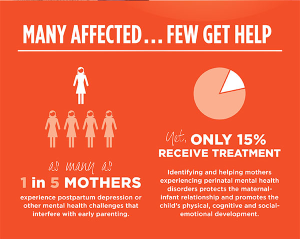 Source: Child Health and Development Institute of Connecticut
Source: Child Health and Development Institute of Connecticut
- Many of the talking therapies have been shown to improve depression for mothers. These include interpersonal therapy, cognitive behavioural therapy and psychoeducation. It has also been demonstrated that non mental health professionals, such a lay health providers, may be ideally suited to deliver these treatments.
- Maternal mental health problems are detectable and treatable, and often may be predictable and preventable.
- Preventing and treating maternal mental illness should include providing meaningful support to empower and enhance the resilience of mothers living in difficult circumstances. Activating healthy social networks is a key component to this.
- In instances of moderate to severe depression, pharmacological treatment (antidepressants) is usually recommended, and is effective in decreasing depressive symptoms.
Caring for carers
The maternity setting can be a stressful environment. Here, health workers are the primary interface between a particularly vulnerable population and health care system, but they often come from the same community as their patients, and are likely to share the same stressful social conditions. Therefore supporting them is just as vital as supporting mothers. Paying attention to the emotional wellbeing of all providers interacting with mothers is likely to improve the quality of care provided to mothers.
Maternal Mental Illness and Child Outcomes
- Anxiety and depression, during and after pregnancy, are associated with serious negative, inter-generational consequences for the mother, infant and society. More on the intergenerational cycle and other issue briefs on our website.
- Depression and anxiety are common in pregnancy and postnatally and have a serious impact on mother and child.
Key messages from Prof Alan Stein’s* paper Effects of perinatal mental disorders on the fetus and child.
- Perinatal mental disorders are associated with risks for a broad range of negative child outcomes, which can persist into late adolescence. However, these disturbances are not inevitable and in the absence of severe or chronic maternal disorder or other adversities, the effect sizes are generally small or moderate.
- Most research has focused on mothers, but growing evidence suggests that the fathers’ mental health is also associated with child developmental disturbances.
- Research should prioritise investigating the effectiveness of interventions in reducing risk to the child and reducing symptoms in the affected parent.
- Parenting is a key modifiable pathway to explain some of the risks of perinatal disorders to the child and should be specifically targeted in interventions.
- Interventions could be most important in the context of additional adversities, such as in socioeconomically disadvantaged populations, where risks to the child seem highest; where several risks are present and resources are scarce, especially in areas in low-income and middle-income countries, innovative strategies are needed.
Father’s and perinatal mental health
Why do we stress the importance of supporting fathers?
“It can take years for negative experiences to manifest so by offering support to fathers too at this stressful time and adopting a preventative approach, more families will enjoy the miracle of childbirth and go on to live happier.”
Read more by Mark Williams on this PSI blogpost
